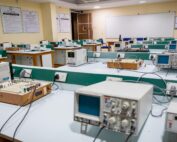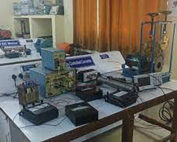B. Tech in Electronics and Telecommunication Engineering
The B. Tech program in Electronics and Telecommunication Engineering prepares its students for an illustrious career in Electronics, communication and IT industry. The program follows an internationalized curriculum in compliance with the requirements of statutory bodies as well as those of national and international accreditation agencies. Emphasis is laid in experiential, project based learning and impact studies which also prepares students for higher studies and entrepreneurial endeavors. The curriculum is flexible allowing students to opt for industry elective courses, different minors and honors. The program is offered from School of Electronics Engineering having world class infrastructure in terms of smart class rooms, state of the art labs, centers of excellence (in collaboration with corporate giants in the domain of Electronic solutions) and Research labs to facilitate students in their innovations in robotics, artificial intelligence, signal processing systems, green energy solutions, embedded systems and wireless communication.
- Candidates who have passed 10+2 examination in 2018,2019 or appearing in 10+2 examination in 2020 are only eligible to apply for B.Tech(4 Years) course of the University.
- Should have studied in regular full time formal education in their schooling/college.
- Pass in 10 +2 or its equivalent with at least 60% marks in Physics, Chemistry and Mathematics taken together.
- Should have born on or after 01.07.1999.
Program Educational Objectives (PEO)
The B. Tech program in Electronics and Telecommunication Engineering aims to prepare the graduates with the following objectives:
- Graduates shall be able to lead a successful career in industries or undertake entrepreneurial endeavors and provide solutions in the areas of electronic system design, communication network operation and management issues, and allied areas of Electronics and Telecommunication engineering.
- Graduates shall be able to perceive the limitation and impact of engineering solutions in social, legal, environmental, economical and multidisciplinary contexts.
- Graduates shall demonstrate professional and ethical responsibilities and thrive to reinforce their knowledge being a part of higher educational programs.
Program Outcomes :
- a) Engineering knowledge: Ability to apply the knowledge of mathematics, science, engineering fundamentals, and an engineering specialization to the solution of complex engineering problems.
- b) Problem analysis: Ability to identify, formulate, review research literature, and analyze complex engineering problems reaching substantiated conclusions using first principles of mathematics, natural sciences, and engineering sciences.
- c) Design/Development of solutions: Ability to design solutions for complex engineering problems and design system components or processes that meet the specified needs with appropriate consideration for the public health and safety, and the cultural, societal, and environmental considerations.
- d) Conduct investigations on complex problems: Ability to use research-based knowledge and research methods including design of experiments, analysis and interpretation of data, and synthesis of the information to provide valid conclusions.
- e) Modern tool usage: Ability to create, select, and apply appropriate techniques, resources, and modern engineering and IT tools including prediction and modeling to complex engineering activities with an understanding of the limitations.
- f) The engineer and society: Ability to apply reasoning informed by the contextual knowledge to assess societal, health, safety, legal and cultural issues and the consequent responsibilities relevant to the professional engineering practice.
- g) Environment and sustainability: Ability to understand the impact of the professional engineering solutions in societal and environmental contexts, and demonstrate the knowledge of, and need for sustainable development.
- h) Ethics: Ability to apply ethical principles and commit to professional ethics and responsibilities and norms of the engineering practice.
- i) Individual and team: Ability to function effectively as an individual, and as a member or leader in diverse teams, and in multidisciplinary settings.
- j) Communication: Ability to communicate effectively on complex engineering activities with the engineering community and with society at large, such as, being able to comprehend and write effective reports and design documentation, make effective presentations, and give and receive clear instructions.
- k) Project management and finance: Ability to demonstrate knowledge and understanding of the engineering and management principles and apply these to one’s own work, as a member and leader in a team, to manage projects and in multidisciplinary environments.
- l) Life-long learning: Ability to recognize the need for, and have the preparation and ability to engage in independent and life-long learning in the broadest context of technological change.
Programme Specific Outcomes (PSO) :
The program specific outcomes are:
- Ability to design and implement electronic circuits, signal processing and communication systems in industry.
- Ability to carry out research in fields of embedded systems, wireless and high speed communication, and advanced signal processing.
- Ability to utilize the knowledge in solving practical problems in real life.
















